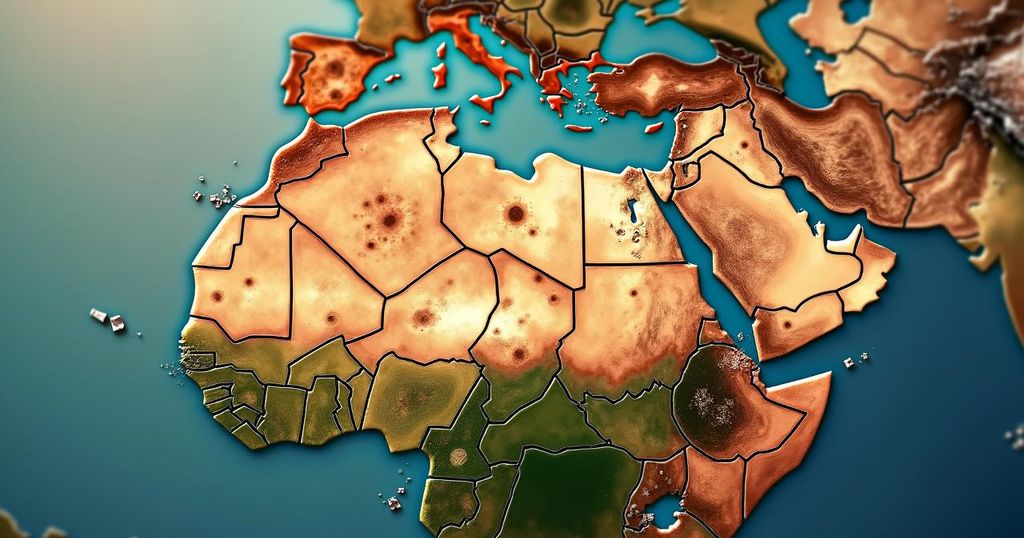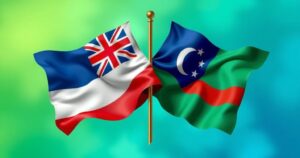Egypt, Eritrea, and Somalia Strengthen Regional Ties Amidst Horn of Africa Tensions

Leaders from Egypt, Eritrea, and Somalia held a significant summit in Asmara to enhance regional security cooperation amidst rising tensions due to the Sudan war, the Ethiopia-Somaliland maritime agreement, and Houthi attacks in the Red Sea. The meeting marked a new alliance that sidelined Ethiopia and focused on respecting sovereignty and confronting regional interference. They pledged to assist Somalia in addressing its security challenges and agreed to form a tripartite strategic cooperation committee.
On Thursday, leaders from Egypt, Eritrea, and Somalia convened for an unprecedented summit aimed at enhancing collaboration on regional security amidst escalating tensions in the Horn of Africa. This meeting occurred in Asmara and underscores a new alignment among these three nations, particularly regarding the destabilizing impacts of the ongoing war in Sudan, a contentious maritime agreement between Ethiopia and the self-declared republic of Somaliland, and the surge in attacks on shipping in the Red Sea by Houthi rebels from Yemen. The summit highlighted the growing estrangement of Ethiopia, which has historically held sway in the region. Relations between Ethiopia and Somalia have deteriorated sharply after Somalia’s backlash against the Somaliland-Ethiopia agreement, prompting Somalia to align itself more closely with Egypt, a longstanding rival of Ethiopia. President Isaias Afwerki of Eritrea hosted Egyptian President Abdel Fattah al-Sisi and Somali President Hassan Sheikh Mohamud for discussions that yielded a joint declaration emphasizing the need for strengthened cooperation to foster regional stability. The leaders advocated for “unequivocal respect for the sovereignty, independence and territorial integrity of the countries of the region,” without naming specific nations. Particularly focused on Somalian matters, they resolved to enhance trilateral cooperation to support Somalia in addressing its internal and external challenges. This includes facilitating the Somali National Federal Army in combating terrorism and safeguarding its national borders. Additionally, the leaders deliberated on the crises in Sudan and the risks posed to marine operations in the Red Sea, agreeing to form a tripartite foreign ministers’ committee dedicated to strategic cooperation across various sectors. This summit also marked President Sisi’s inaugural visit to Asmara since the early 1990s, signaling a shift in diplomatic engagements within the region. Somali President Mohamud has made multiple previous visits to Eritrea, solidifying their bilateral relations. The summit was notably influenced by Ethiopia’s recent agreements that have unsettled both Somalia and Eritrea, particularly the leasing of coastal territory from Somaliland—an action vehemently opposed by Somalia as a violation of its territorial integrity. In response to perceived threats from Ethiopia, Somalia has strengthened its military collaboration with Egypt, which has also mobilized troops for an African Union initiative against Al-Shabaab militants. This backdrop of heightened military alliances further complicates the diplomatic landscape, particularly against the existing tensions surrounding the Grand Ethiopian Renaissance Dam, which Egypt claims endangers its primary water supply. Furthermore, relations between Eritrea and Ethiopia remain tense despite Eritrea’s prior support of Ethiopian government forces during the conflict with Tigrayan rebels. Public statements from the Ethiopian foreign ministry, however, assert a “peaceful” relationship with Eritrea, emphasizing mutual goodwill and neighborliness.
The article revolves around the recent summit involving the leaders of Egypt, Eritrea, and Somalia, which was convened against a backdrop of increasing regional instability in the Horn of Africa. This instability is primarily due to the ongoing conflict in Sudan, the controversial maritime deal involving Ethiopia and Somaliland, and the threats posed by Houthi attacks in the Red Sea. The meeting reflects significant shifts in alliances, particularly with Ethiopia being isolated, and highlights the dissatisfaction Somalia and Eritrea feel towards Ethiopia’s maritime agreements. The regional dynamics are further complicated by historical tensions, including border disputes and resource concerns related to the Nile River.
In conclusion, the trilateral summit in Asmara marked a pivotal moment in the Horn of Africa’s geopolitical landscape, demonstrating a collaborative effort among Egypt, Eritrea, and Somalia to confront regional challenges. This new alliance reflects a significant shift away from Ethiopia, particularly in light of the contentious Somaliland maritime agreement and ongoing conflicts in Sudan. As these nations strive to foster stability and protect their sovereignty, their unity could significantly influence the future of security and cooperation in the Horn of Africa.
Original Source: www.modernghana.com








